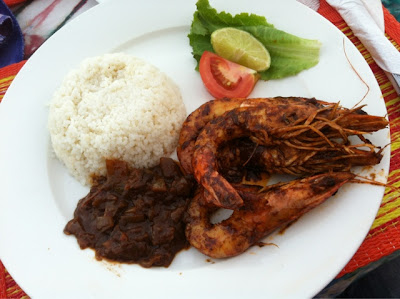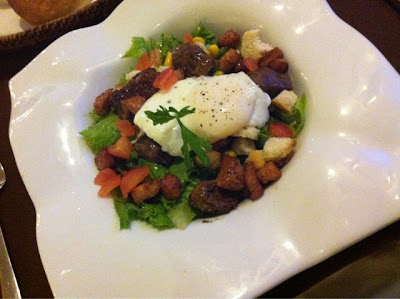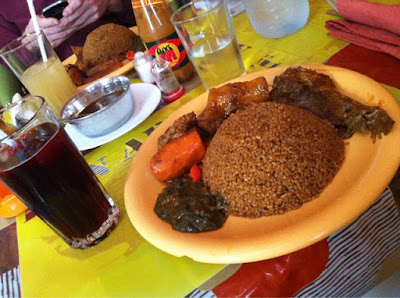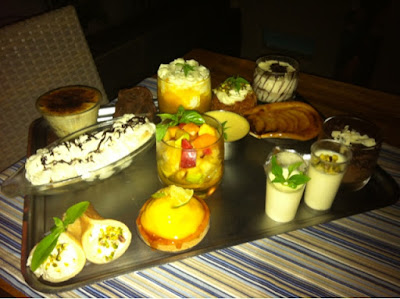I accidentally deleted this post...so here it is again.
An article that I wrote last year, that I thought to bring up:
During my internship at the UN, which I really enjoyed, the only complaint that I had was that the meeting rooms were so cold. Since I interned during the summer, I would walk to work in 80 or 90 degree heat (Fahrenheit of course); entering the UN building felt like opening the door in the freezer aisle at the super market. Goosebumps flared all over my exposed arms and legs like a rash as I sat down to take notes at a meeting that, ironically, was on climate change and sustainable development. At this point, most scientific experts have accepted or confirmed that pollution, including excessive use of air conditioning, has an enormous impact on global warming. Why then, are our buildings still so cold? Though I was uncomfortable in my skirt and short sleeved blouse, I realized that the temperature felt great when I chose to wear a pant suit. In my suit, I was sweating and panting on my way to work, but the icy blast of air as I entered the lobby was a welcomed relief. If the UN, and other business buildings, raised the thermostat during summer days, people would be comfortable in short sleeves and other warm weather clothing, but wearing a suit would become unbearable. Many professional buildings therefore, must maintain lower temperatures in order to accommodate people who wear suits. In turn, more people, like myself, wear suits in order to be comfortable in these temperatures. In many organizations, especially the UN, people are too busy addressing pressing problems, such as the impending sinking of small island nations, to worry about clothing. Our expectations for dress however, are having an impact on our modification of our climate, which in turn has an impact on the health of our planet. Clothing is trivial compared to piracy, war and famine, but in turn it is also something that is far easier to address and change. I believe that we should begin by rethinking the “suit.”
Despite having approximately 200 nations in the world, with different traditional dress, the suit has become the universally accepted dress for business and other formal occasions. In fact, when most of us say or hear the word “suit” in English, we assume that we are talking about long pants and a matching jacket, usually worn with a long sleeved dress shirt with a tie. Originating in European culture, and having evolved during the past centuries, this style was brought to the rest of the world through diplomacy but also through colonization. When many European nations, such as Britain and France, were expanding their empires, they promoted the idea that their cultures were civilized, and local savages should learn from them in order to advance. While many people were forced to follow European ways, other people voluntarily tried to emulate them, hoping that their own nation could become more powerful. As a result, several regions across the world began to accept and adopt certain European norms. In the 18th and 19th century, international relations, for many nations, were solely comprised of their interaction with America or the European Nations; many of these relations were not on equal level either, they were between colonizer and colonized. Colonizers of course, would not don local dress, and may not have taken an individual seriously if he wore his own traditional formal wear. Thus, the suit became the default dress for many important meetings, and though the number of colonies has decreased dramatically, that tradition still continues today.
What if we walked into a meeting on humanitarian disaster and all of the delegates were wearing cultural clothing? What if they were wearing warm weather clothing, with bare arms and legs? Many of us would feel as though the meeting is not as important, or that the people did not take the subject seriously, because we have all come to expect men to wear suits for formal occasions. I specify men, because women’s business wear is more flexible, possibly because women were not even allowed or able to participate in business or politics until the 20th century and were not part of that gradual standardization process, or have not been in the field long enough for such conventions to develop. Men have very little, if any, flexibility for business wear. Many of us have grown up with the idea that suits are, essentially, the only option for men in formal occasions. Perhaps they can vary the pattern on their ties, the color of their dress shirts, or the fabric of the suit itself, but the outfits generally remain the same. A man who shows up at a professional meeting in anything else but a suit may be regarded as rude, or ignorant of social norms. At the moment, imagining world leaders, CEOs, people who hold positions of power, sitting around in summer wear while discussing nuclear proliferation, is comical.
In some organizations, such as the United Nations, cultural attire is now an acceptable option. Cultural attire however, though tolerated, is not necessarily encouraged, and definitely not universally acceptable. The Asia-Pacific Forestry Week has declared 7 November 2011 to be a “traditional costumes day.” Would any of us refer to a suit as a costume? How many of us would risk going to an interview in cultural attire? Our adherence to suits is ingrained in our society—a suit is universally acceptable and always a safe option. Thus, even in scorching heat, even if you can fry an egg on a car hood and tires pop from gas expansion, business men, politicians, will still be wearing high collars, long sleeved shirts and pants, with a jacket on top and a thick tie wrapped around their necks. In turn, businesses will keep their premises at unreasonably low temperatures in order to accommodate these people. Is it really worth the impact to our environment to maintain this clothing formality that essentially requires us to modify our climate beyond what is actually necessary?
The world would benefit from a fashion challenge, one that would design formal attire that is adjusted for a future that needs to consider reducing carbon emissions. So far, we still have no antidote to global warming, and currently the best method that each individual can make is to pollute less. If many of the business buildings kept their thermostats at a warmer temperature, the level of carbon emissions would decrease significantly each year. People would be able to remain comfortable at these higher temperatures if it was socially acceptable for them to wear lighter clothing, such as summer wear, or certain types of cultural attire. The obvious benefit of this change in style is the amelioration of environmental damage and reduction of energy costs. Savings on energy can then be devoted to other activities, which can be especially helpful for organizations like the UN with limited budgets and a huge array of responsibilities. Flexibility in attire might also encourage more people to wear garments from different cultural backgrounds, contributing to the visual diversity of our businesses. Equal opportunity advocates could also argue that men would have more freedom to express themselves through dress. Such change may be difficult, primarily for reasons of vanity and the current uncertainty of proper alternatives. It is always difficult to break custom, especially in vocations that depend much on formality. Even today, many individuals might subconsciously consider an individual in a colorful cultural “costume” to be less competent and intelligent than an individual in a suit. It is an important topic to consider, especially since almost all of us agree that human beings are altering their environments, and by extension their planet, in ways that are no longer sustainable.
I would rather have my country’s delegates adjust their attire so they can be comfortable in an indoor environment that does not differ as drastically from the outdoor temperature, even if that attire consists of lightweight cotton and open toed shoes, than continue our current trend of massive waste of resources. With such measures, we can give scientists around the world more time to solve our environmental crisis, and better preserve our planet for our descendants. As the threat of global warming and a world with less land, biological diversity, and increased natural disasters looms before us, I hope that we can think creatively, and tackle the problems that are so clearly within our control, especially those that require a change as simple as picking a different outfit to wear. Formality has always been an important part of all relationships, whether business, diplomatic, or even personal. Despite these traditions, I hope that we are flexible enough to adapt to new emergencies, and recognize that some matters, such as environmental preservation, are more important than a style of clothing that essentially became a norm through centuries of European and American world domination.
The fashion industry could look to what was the traditional dress for notable public figures in countries with more extreme temperatures, such as India, or Kenya, or work on adapting summer wear. If we as individuals can let go of our traditional expectations of how an educated and intelligent person should dress, we can move forward and take practical steps to mitigating climate change. It would be nice if all of the problems that face the world, such as mass draught, over fishing, and oil spills, were as simple to change as the clothes that we don. As the French saying goes, “l’habit ne fait pas le moine,” or clothing does not make the man. Until we find a better solution to climate change, I hope that our vanity will not be the reason that prevents us from doing everything we can to protect the only planet that we have.


















